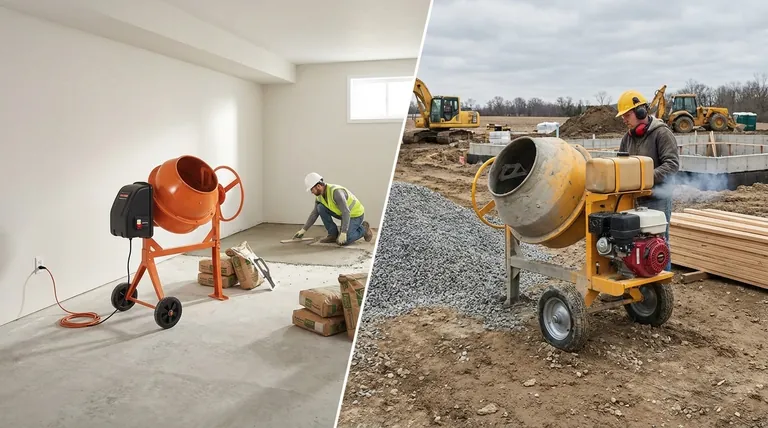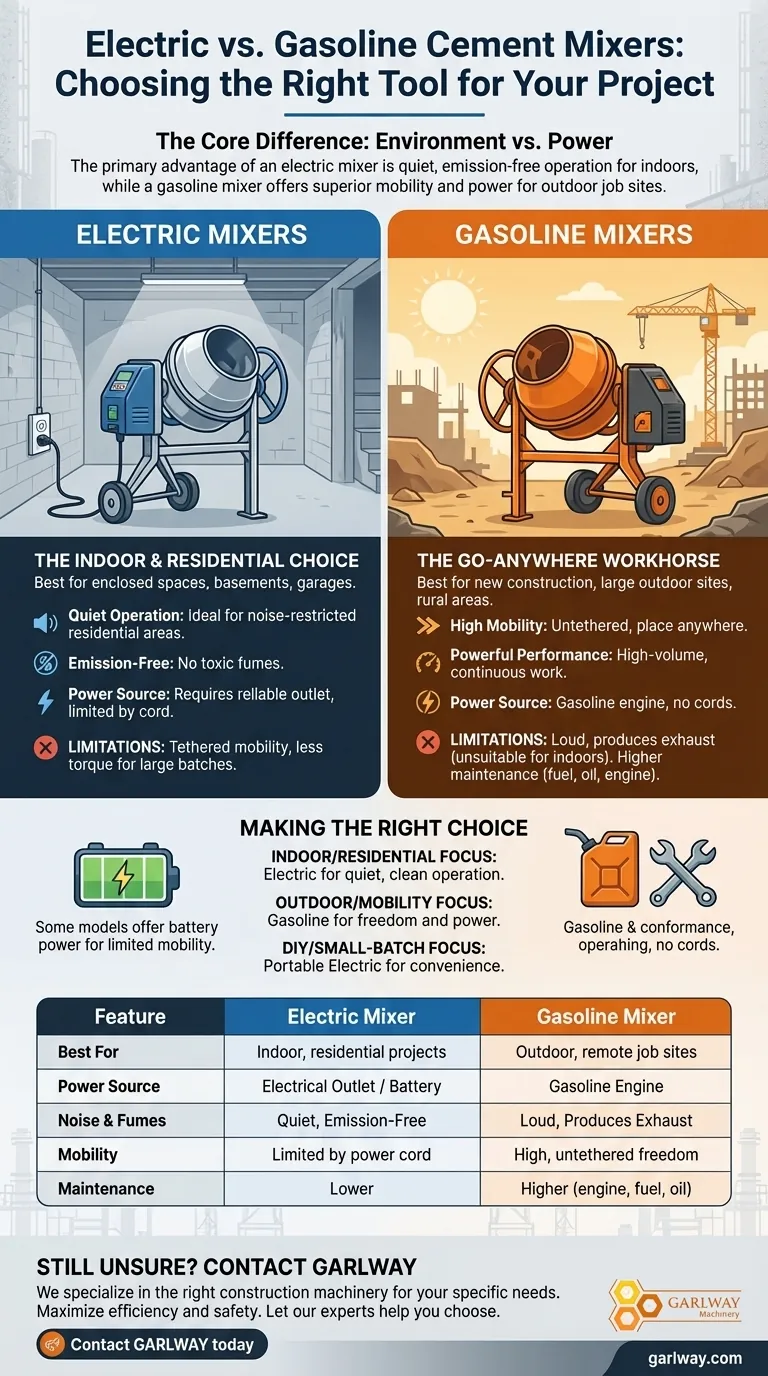The primary advantage of an electric cement mixer is its quiet, emission-free operation, making it ideal for indoor and residential use. In contrast, a gasoline-powered mixer offers superior mobility and power, perfect for outdoor job sites where electricity is unavailable or inconsistent.
The decision between electric and gasoline is not about which is universally "better," but which is the right tool for a specific environment. Your choice hinges on a simple trade-off: convenience and quietness versus raw power and untethered mobility.

The Core Difference: Environment vs. Power
Your work site is the single most important factor when choosing a mixer. The location dictates your requirements for noise, fumes, and access to a power source.
Electric Mixers: The Indoor & Residential Choice
Electric mixers are the standard for projects in enclosed spaces or populated areas. Their main advantage is the lack of toxic exhaust fumes, making them safe for basements, garages, or any indoor renovation.
They operate far more quietly than their gasoline counterparts, which is a critical consideration when working in residential neighborhoods with noise restrictions.
The only requirement is a reliable power source, which can sometimes limit their range on a larger property, requiring long extension cords.
Gasoline Mixers: The Go-Anywhere Workhorse
Gasoline engines provide robust power and complete freedom from electrical cords. This makes them the definitive choice for new construction sites, rural properties, or any large outdoor area without convenient power outlets.
This mobility ensures you can position the mixer exactly where it's needed, improving workflow and efficiency on demanding jobs. They are built for high-volume, continuous work.
Understanding the Trade-offs
Neither option is perfect for every scenario. Understanding their inherent limitations is key to avoiding frustration on the job.
The Limitations of Electric Mixers
The most obvious constraint is the power cord. You are physically tethered to an outlet, which can be a logistical challenge on expansive sites.
While powerful enough for most small-to-medium jobs, they may lack the high-torque performance of a gas engine when mixing very large or dense batches of concrete. Some modern mixers mitigate this with rechargeable batteries, offering a compromise between mobility and clean power.
The Downsides of Gasoline Mixers
Gasoline engines are loud and produce exhaust fumes. They are completely unsuitable for indoor use and can be a nuisance in quiet residential areas.
They also require more maintenance, including regular refueling, oil checks, and engine servicing, adding to their long-term operational cost.
Making the Right Choice for Your Project
Evaluate your most common work environment to select the mixer that will serve you best.
- If your primary focus is indoor work or residential projects: An electric mixer is the clear choice for its quiet, emission-free operation.
- If your primary focus is mobility and power for outdoor sites: A gasoline mixer offers the freedom and performance required where electricity isn't an option.
- If your primary focus is general DIY and small-batch mixing: A portable electric model provides the best balance of convenience and capability for most home-based tasks.
Ultimately, aligning the tool's fundamental design with the demands of your job site ensures maximum efficiency and safety.
Summary Table:
| Feature | Electric Mixer | Gasoline Mixer |
|---|---|---|
| Best For | Indoor, residential projects | Outdoor, remote job sites |
| Power Source | Electrical Outlet / Battery | Gasoline Engine |
| Noise & Fumes | Quiet, Emission-Free | Loud, Produces Exhaust |
| Mobility | Limited by power cord | High, untethered freedom |
| Maintenance | Lower | Higher (engine, fuel, oil) |
Still Unsure Which Mixer is Right for Your Project?
At GARLWAY, we specialize in providing the right construction machinery for your specific needs. Whether you're a contractor on a remote site requiring a powerful gasoline mixer or a DIY enthusiast needing a quiet electric model for a home renovation, we have the solution.
Let our experts help you choose the perfect cement mixer to maximize efficiency and safety on your job site.
Contact GARLWAY today for a personalized consultation and discover our full range of high-quality winches, concrete mixers, and batching plants.
Visual Guide

Related Products
- Commercial Electric Concrete Mixer Machine HZS 50 Small Batch Plant for Sale
- Portable Electric Concrete Mixer Machine for Cement Mixing
- Portable Concrete Mixer Machine Equipment for Mixing Concrete
- Hydraulic Concrete Mixer Machine Cement Mixing Equipment for Mixture Concrete
- JZC500 Large Cement Mixer Machine Price for Concrete Mix
People Also Ask
- How can small cement mixers be positioned or moved? Maximize Job Site Efficiency
- How do I choose a cement mixer? Find the Perfect Match for Your Project Scale and Power Needs
- What are the main types of cement blending equipment? A Guide to Silos, Conveyors & Mixers
- How does a small cement mixer improve mixing quality? Achieve Professional-Grade Concrete Strength
- What are the key benefits of using a small cement mixer? Save Time, Labor, and Achieve Perfect Mixes
- Can you mix self leveling concrete in a cement mixer? Avoid Costly Flooring Mistakes
- What should I look for in a cement mixer? A Guide to Capacity, Power, and Portability
- What is the best cleaner for a cement mixer? Master Wet vs. Hardened Concrete Removal



















